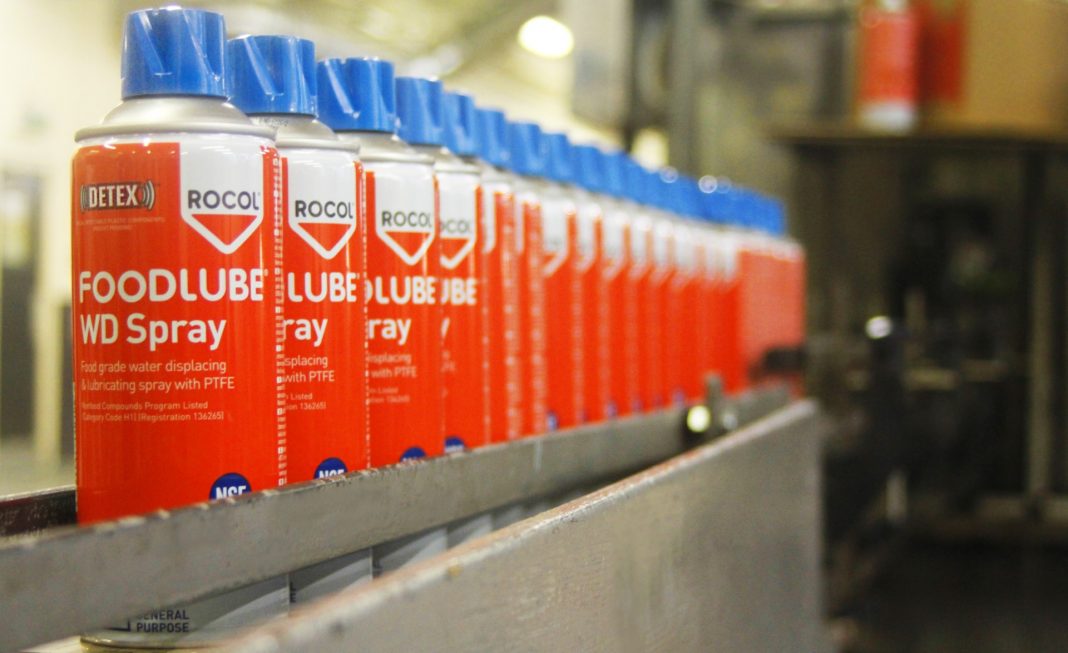With BRC Global Standard for Food Safety (Issue 9) now in force, food manufacturers face even greater pressure to ensure compliance throughout the supply chain. ROCOL Lubricants food specialist Andy Howard looks at steps they can take to achieve this with their lubricant usage.
What does the BRC Global Standard Food Safety (Issue 9) mean for food manufacturers?
BRCGS Issue 9 increases the focus on creating a strong product safety culture across food manufacturing facilities. It specifies the safety, quality and operational criteria that manufacturing organisations are measured against to ensure legal compliance and the protection of the end consumer.
It extends safety criteria across a much wider range of companies and means that, from February this year, facilities operating at every point in the food manufacturing supply chain are being audited to the same stringent criteria. An animal feed manufacturer must now demonstrate the same stringent food safety performance as a chocolate maker.
As the new standard is rolled out, manufacturers will need to prove their food safety credentials and demonstrate the steps they take on a day-to-day basis throughout their organisation to prevent incidents that can put the safety of end products at risk.
A safety culture involves eliminating risk at every point of the manufacturing process, which is where ROCOL’s FOODLUBE range of food grade lubricants comes in. FOODLUBE products are manufactured within the strict guidelines of ISO 21469:2006, ensuring zero risk to products and consumers in the event of incidental food contact. They are also NSF approved, Halal, Kosher, and have Vegan Society registration, delivering a product range that supports vital food safety and audit compliance.
How can manufacturers ensure their lubrication management programme is fit for purpose?
Selecting the most appropriate lubricants to support food safety across your entire operation is just one part of the story. Lubricant usage and effectiveness also have an important part to play. As well as supporting safety, a proactive approach to lubrication management is key to achieving equipment efficiency, plant productivity and eliminating machine downtime.
The ROCOLcare lubrication management programme starts with an audit to assess lubricant use, frequency and application methods for every asset in your production facility. From there, a bespoke lubrication schedule is developed, which maximises machine performance and lubricant use. This is followed by operator training to ensure that the right products are applied in the right quantities, at the right intervals, to deliver optimum operational efficiency and rationalised lubricant usage. As well as efficiency benefits, this proactive approach provides full audit compliance regarding your lubrication system.
How does ROCOL ensure products meet real-life customer needs?
Our approach to product development is simple. It starts by understanding the challenges end users are facing, which enables us to focus our technical expertise and NPD resources in these areas to help overcome those challenges and make customers’ lives easier.
This customer-back approach has resulted in many new product launches, formulations and formats across the business. Our DETEX metal detectable caps and actuators were developed in partnership with customers to support preventative control programmes across food production sites and are now used on all ROCOL aerosol and spray cans and standard grease cartridges.
It also led to the recent introduction of FOODLUBE 1500 Spray, a highly tacky oil in aerosol format for the long-lasting lubrication of chains and presses in food, pharmaceutical and other clean environments. The high viscosity, high-tack formulation reduces contamination risks by minimising drips when used on overhead equipment, displacing water in situ and penetrating hard-to-reach channels, such as chain links, to deliver effective lubrication while protecting against wear and corrosion.
How important is it that food manufacturers continue to invest in staff training around the machinery maintenance?
A culture of food safety in your organisation is only ever as strong as your weakest link. The food safety culture section of BRCGS Issue 9 has evolved, and now looks at the behavioural changes required within an organisation to improve product safety. This extends across the entire organisation; it is not limited to technical and production teams. It requires manufacturers to implement a plan for the development, maintenance and improvement of a food safety culture – and training is key.
Making sure that the relevant people in your team are equipped with the knowledge to deliver maintenance regimes that support and promote food safety is an important aspect of your wider training programme. Not only will this support audit compliance, it will also eliminate the risks associated with incorrect lubricant application, which can reduce equipment efficiency and result in lubricant overspend. From the fundamentals of lubrication to in-depth training for specific industries or applications – bearings and chains through to gearboxes and hydraulics – our training programme is designed to keep your maintenance teams at the top of their game.


